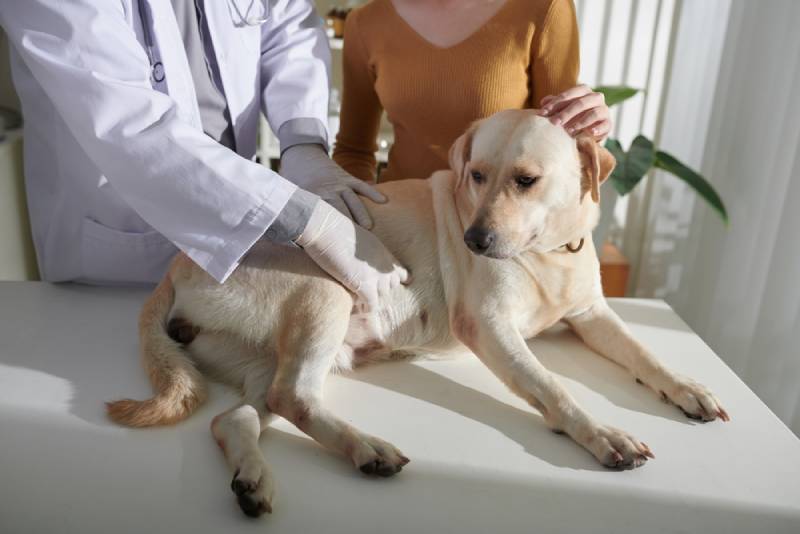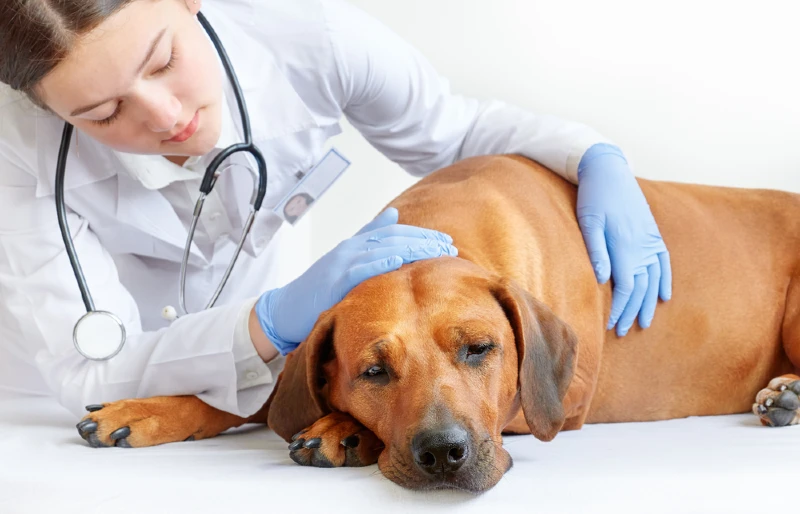
Whipworms are intestinal parasites which can be fairly frequent in canines. The medical time period for a whipworm infestation is trichocephalosis or trichuriasis, which comes from the Latin identify of those parasites, Trichuris vulpis. This parasite is commonly transmitted to canines after they ingest contaminated feces or different matter containing contaminated feces.
Trichuris vulpis are small worms that resemble a whip, with one finish being thick and the opposite being skinny. Whipworms connect to the intestinal wall, inflicting varied well being issues, reminiscent of diarrhea, weight reduction, and anemia.
The eggs are microscopic, so a coproparasitological examination is required for analysis. Whipworm infestation can turn out to be extreme if the affected canine shouldn’t be handled with antiparasitic treatment and supportive remedy (in extreme instances).
What Are Whipworms?
Whipworms are parasites that belong to the Trichuridae household. They’re round 3–5 centimeters lengthy, have a whitish shade with a reddish tint, and appear to be a whip: The top (slender) is positioned on the skinny finish, whereas the tail (the thick finish) homes the reproductive system. This unequally calibrated worm is also called Trichuris vulpis and happens continuously in canines. They’re extra frequent in older canines than puppies however can infest pets of any age.
Whipworms have a easy life cycle. The grownup worms lay eggs within the massive gut, which go within the feces, reaching the setting. The larva will develop contained in the egg in 2–4 weeks. Eggs might be ingested when canines groom themselves or after they eat from the bottom (particularly contaminated feces). The eggs of T. vulpis hatch within the small gut and have an oval form, a thick outer shell, and bipolar plugs.
After a couple of month, the larvae migrate to the massive gut, the place they turn out to be adults that may reproduce and lay eggs. Eggs can survive for years within the setting. T. vulpis doesn’t normally infest people, however there are just a few reported instances. People are most continuously infested with Trichuris trichiura.

What Are the Indicators of Whipworms in Canine?
For canines with gentle infestations, there are normally no medical indicators. Because the infestation turns into huge, irritation of the massive gut could consequence, and any of the next medical indicators could happen:
- Low urge for food
- Weight reduction
- Mucus or blood within the stool
- Diarrhea (which might turn out to be power and troublesome to regulate, resulting in weight reduction and dehydration)
- Anemia (pale gums, weak point, heavy respiratory), in case of power and extreme infestations
Hardly ever, a whipworm infestation may cause a syndrome much like Addison’s disease. The medical indicators, reminiscent of the lack to control electrolytes and weak point, can result in extreme dehydration, which might put your canine’s life in danger.
Weight reduction, dehydration, diarrhea with blood, and anemia can be medical indicators of extra extreme situations and extremely contagious viral infections like parvovirus, particularly in the event that they happen in puppies. Contact your veterinarian as quickly as potential when you discover any of those medical indicators or different adjustments in your canine’s habits.
It is usually vital to notice that medical indicators of whipworm infestation could also be current earlier than the eggs are eradicated together with the canine’s feces.
What Are the Causes of Whipworms in Canine?
The whipworms lay eggs within the massive intestines of the infested canine, that are handed out within the pet’s stool. The eggs then mature over a interval of two to 4 weeks into an infective stage (infective larva). The one method canines can turn out to be infested with whipworms is by ingesting the eggs that include the infective larva of T. vulpis.
Canine can ingest the eggs together with feces or different matter that incorporates contaminated feces. Eggs may get in your canine’s fur when they’re mendacity on the bottom or enjoying outdoors, they usually could then ingest the eggs after they groom themselves.

How Are Whipworms Recognized in Canine?
Whipworm eggs are microscopic, in order that they can’t be seen with the bare eye in your canine’s feces. They’ll solely be detected by coproparasitological examination or antigen testing. Nevertheless, even when your canine is infested and the grownup feminine lays eggs, they could be troublesome to see when testing canine feces as a result of the females lay eggs intermittently. Because of this, repeated assessments could also be crucial. If a whipworm infestation is suspected, even when no eggs are discovered, it’s common to prescribe antiparasitic remedy.
Furthermore, whipworm infestation (in uncommon instances) may end up in medical indicators much like these of Addison’s illness. Consequently, your veterinarian will check for that illness earlier than anything as a result of this situation is extreme.
What Is the Remedy for Whipworms in Canine?
Many antiparasitic medicines can efficiently deal with intestinal worms, together with whipworms. Repeated remedies are normally advisable for finest outcomes (e.g., after 3 weeks and three months). In case your canine is already taking antiparasitic medication (e.g., for heartworms), you need to notify your vet about this facet.
Additionally, the veterinarian will advocate that you simply disinfect the place the place your canine sleeps or spends their time and promptly get rid of their waste as a result of the eggs can survive for a very long time within the setting.
In extreme instances of T. vulpis infestation, the affected canines can be hospitalized for supportive remedy and probably a blood transfusion (if the anemia is extreme).

How Do I Care For a Canine With Whipworms?
In case your canine has been recognized with whipworms, all it’s a must to do is observe your vet’s recommendation. This situation shouldn’t be extreme whether it is intervened as quickly because the medical indicators happen.
The situation turns into power when diarrhea, dehydration, and anemia happen. Dehydration and anemia can put your canine’s life in peril, particularly if they’re a pet or have a low immune system. Because of this, you will need to deworm your canine commonly or take them to common check-ups.
Regularly Requested Questions (FAQs)
Are Whipworms Painful for Canine?
Sure, whipworms can be painful for dogs as a result of they connect to the gut and trigger irritation and discomfort. Different medical indicators of whipworm infestation in canines are diarrhea (generally with blood), lethargy, lack of urge for food, and weight reduction. In extreme instances, dehydration (as a result of repeated episodes of diarrhea) and anemia could happen. Contact the veterinarian in case your canine reveals these medical indicators.

Do Whipworms Make Canine Hungry?
More often than not, canines with whipworm infestations expertise a scarcity of urge for food. However in some instances, they will trigger a sudden increase in hunger. Even so, your canine can reduce weight as a result of the intestinal worms feed on the vitamins that your pet consumes.
Conclusion
Whipworms (Trichuris vulpis) are intestinal parasites which can be continuously present in canines. They can cause a lack of appetite, weight reduction, diarrhea (generally with blood), dehydration, and even anemia. Dehydration and anemia can result in the demise of your pet if not intervened in time. The causes of infestation with T. vulpis are represented by the ingestion of eggs containing the infective larva. Eggs might be ingested together with contaminated feces, with different matter containing contaminated feces, or from the fur when canines groom. If medical indicators happen, you will need to take your canine to the vet. To forestall whipworm infestation, common deworming is critical.
Featured Picture Credit score: Dragon Photographs, Shutterstock



